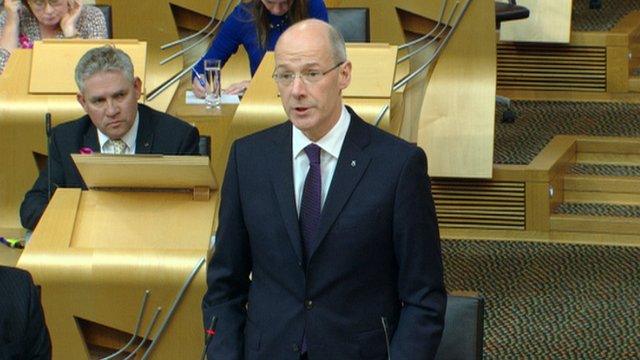Scottish Budget: Boost for first-time buyers
- Published
Scottish Finance Secretary John Swinney sets out new taxes in the draft budget 2015-16
Homebuyers in Scotland will pay no tax on properties costing less than £135,000, Finance Secretary John Swinney has announced.
And a 12% marginal rate for houses costing more than £1m will come into force next April, when stamp duty is replaced north of the border.
Mr Swinney's plan came in his budget proposal for the year ahead.
Opposition politicians said the finance secretary had failed to live up to his promise of protecting health spending.
Under the government's new Land and Building Transactions Tax, external, a marginal tax of 2% would apply to the proportion of a transaction between £135,000 and £250,000, while a 10% rate will apply to those between £250,000 and £1m.
Mr Swinney told MSPs: "As a result of the rates I have announced today, nobody will pay tax on the first £135,000 of their house purchase. 5,000 more transactions will be taken out of tax, supporting first-time buyers and those buying properties in the affordable market."

By Douglas Fraser, BBC Scotland business and economy editor
"Remember the referendum campaign? Well, you'll probably also remember the warning that taxes are a volatile way of funding services.
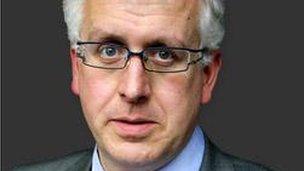
That argument was mainly about offshore oil and gas tax, which is the most volatile of government funding sources.
But with the arrival of more modest tax powers at Holyrood with today's draft budget, MSPs are now required to develop a novel skill - handling the new uncertainty about how much money the new body called Revenue Scotland will collect.
This is obvious when you think about it: the link between tax-raising and tax-spending, and the realisation that has been absent from Holyrood thinking, that balancing the books involves more than one side of the ledger. But the implications are profound.
Read more from Douglas Fraser....
By Brian Taylor, BBC Scotland political editor
"The minister [John Swinney] insisted that 90% of folk would be better or no worse off under the new system.
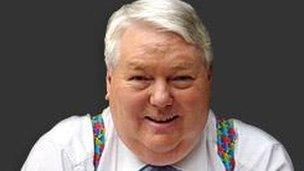
Mr Brown [Gavin Brown of the Tories] scowled quietly, perhaps thinking of the 10% and their possible voting inclination.
"More generally, Mr Swinney was in the mode historical. This was, he said, the first time that a Scottish Parliament had been presented with tax proposals since before the Act of Union in 1707. That too had been about property tax.
"His approach in resuming taxation had been drawn from Adam Smith, the sage of Kirkcaldy who set out a series of maxims in 1776 to the effect that taxes should offer certainty, convenience and efficiency while being proportionate to the ability to pay."

The finance secretary also said tax would be reduced for a further 44,000 house sales up to the value of £325,000.
And he added that the 12% top rate would ensure the most well-off made a contribution to the public purse.
Under the new system, 90% of taxpayers and 95% of non-residential taxpayers would be better or no worse off, Mr Swinney added.
The new charges will mark the first time Scottish Parliament has levied taxation since the Union in 1707, made possible after new powers were devolved to Holyrood following proposals put forward by the Calman Commission, external on strengthening devolution.
"In exercising its first judgements on national taxes, this government has put fairness, equity and the ability to pay at the heart of what it has done," Mr Swinney argued.
"That is the benefit of putting decisions about Scotland's future in Scotland's hands."

Property tax winners and losers
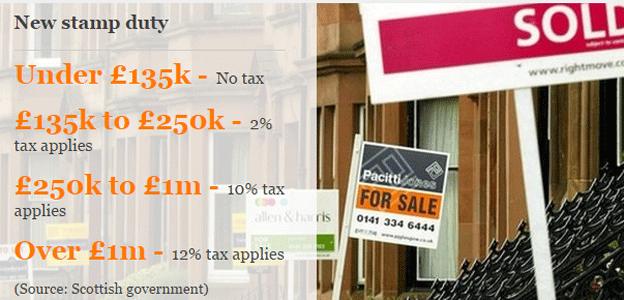
A £130,000 purchase now would require a duty payment of £1,300 - but a £130,000 purchase next April won't require any tax payment.
A house bought at £136,000 in April 2015 would require a one-off payment of £20 - but a house bought at £136,000 now would require a one-off payment of £1,360.
A property bought at £300,000 in 2015 would mean a £7,300 charge [0% of £135,000; 2% of £115,000 and 10% of £50,000]. With stamp duty for a house at this price currently at 3%, the stamp duty payment would be £9,000.
A £3m mansion bought in April 2015 would bring a tax charge of £317,300. Purchase that now and you'd be paying £210,000.

Mr Swinney also said a new tax paid by companies and councils when they dispose of waste to landfill would be "revenue-neutral", with a standard rate of £82.60 per tonne and a lower rate of £2.60 per tonne.
Elsewhere, the finance secretary said the 2015-16 budget plan, external would see:
NHS funding increased to more than £12bn
£4.5bn of infrastructure investment secured to build new colleges, health facilities and schools
An investment drive of more than £390m to deliver 6,000 affordable homes, and £125m of additional support for the housing sector.
More than £300m over two years to extend child care to 600 hours for all three and four-year-olds and vulnerable two-year-olds.
However, some government departments face cuts to boost spending in other areas, including:
A £46m cut in the justice resource budget, which will be reduced to £2.5bn
Economic development agencies Scottish Enterprise and Highlands and Islands Enterprise face a £40m cut, with the savings redistributed to housing
The new ScotRail franchise, which begins in April 2015, will see a £46m cut in support for rail services, leaving a pot of £331m
Public sector pay restraint will continue for another year
Labour finance spokesman Iain Gray welcomed the move to replace stamp duty, but said successive Scottish budgets had failed to protect the NHS.
Iain Gray on Scottish draft budget
Mr Gray said the budget showed a real terms rise of about 1% - less, he told MSPs, than a quarter of the increase planned in England.
"Health spending here has not kept up with increases, even compared to the Tory-run English NHS," said Mr Gray, adding: "Our NHS has had some £700m less than it should have, had he (Mr Swinney) kept his promises.
"Use of the private sector in our health service has spiralled. Plans are being made for around £450m of cuts to accommodate the resulting financial pressure."
Hard-working families
The Conservatives' Gavin Brown also questioned whether the extra £288m announced for the health service would meet the SNP's commitment to protecting the NHS budget.
And he attacked the new property tax, asking: "How can the cabinet secretary justify an eye-watering 10% tax on houses over the value of £250,000?
"There are pockets of this country, such as Edinburgh, where family homes for hard-working families are considerably in excess of that.
"We all understand that it increases as houses go up but 10% I think is difficult to justify."
Scottish Liberal Democrat leader Willie Rennie said the budget, which still needs the final approval of parliament, needed further work to ensure it delivered for families.
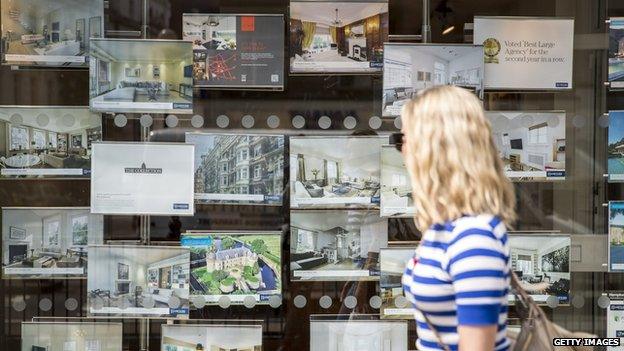
Mr Swinney said his proposals would help first-time buyers
"We need to see action to restore college funding to 2011 levels, so more young people can get the best start in life, and on mental health so that these crucial services get the investment they need," he added.
Patrick Harvie, the Scottish Green co-leader, welcomed spending commitments on affordable housing, new colleges and the NHS - but said it was time to address the issue of council tax, which has been frozen since the SNP came to power in 2007.
"There is talk today of a historic moment as new tax rates are set, and yet the one major tax we've had control of since 1999 is council tax, which remains unfair and unreformed," he said.
Mr Swinney said Scotland's economy was back up to pre-recession levels, but added that finances still faced a squeeze on public spending, due to reductions in Scotland's Treasury-funded budget.
As the Westminster government attempts to reduce the nation's spending deficit, Mr Swinney said cuts to Scottish spending amounted to a 10% cut in real terms over five years, and capital spending cuts of more than 25%.
- Published9 October 2014
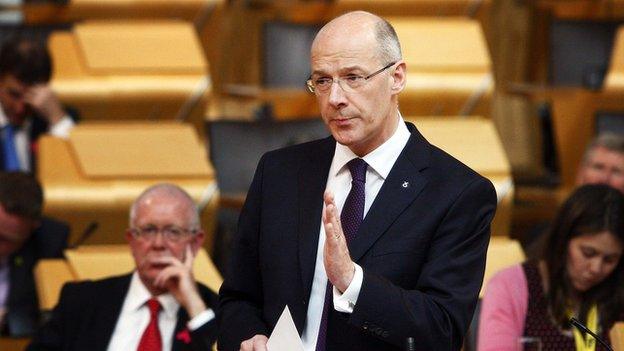
- Published9 October 2014
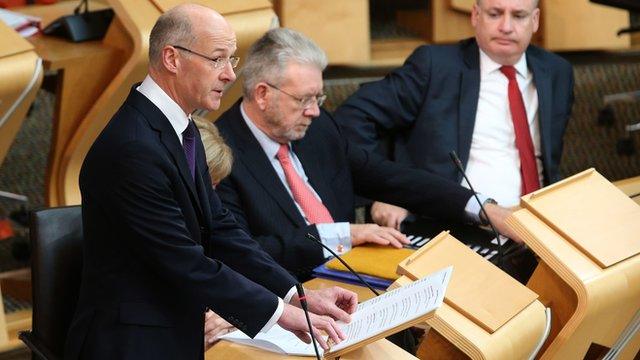
- Published9 October 2014
